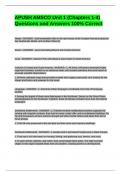APUSH AMSCO Unit 1 (Chapters 1-4)
Questions and Answers 100% Correct
Mayas - ANSWER - built remarkable cities in the rain forests of the Yucatan Peninsula (present-
day Guatemala, Belize, and southern Mexico).
Aztecs - ANSWER - were dominating Mexico and Central America,
Incas - ANSWER - based in Peru developed a vast empire in South America.
Cultures of Central and South America - ANSWER - 1. All three civilizations developed highly
organized societies, carried on an extensive trade, and created calendars that were based on
accurate scientific observations.
2. All three cultivated crops that provided a stable food supply, particularly corn (maize) for the
Mayas and Aztecs and potatoes for the Incas.
Language - ANSWER - 1. American Indian languages constituted more than 20 language
families.
2. Among the largest of these were Algonquian in the Northeast, Siouan on the Great Plains,
and Athabaskan in the Southwest. Together, these 20 families included more than 400 distinct
languages.
Southwest Settlements - ANSWER - 1. Pueblos evolved multifaceted societies supported by
farming with irrigation systems. they lived in caves, under cliffs, and in multistoried buildings. By
the time Europeans arrived, extreme drought and other hostile natives had taken their toll on
these groups.
2. Their life was preserved in the arid land and their stone and masonry dwellings.
Northwest Settlements - ANSWER - 1. people lived in permanent longhouses or plank houses.
2. They had a rich diet based on hunting, fishing, and gathering nuts, berries, and roots.
3. To save stories, legends, and myths, they carved large totem poles. The high mountain
ranges in this region isolated tribes from one another, creating barriers to development.
,Europe Moves Toward Exploration - ANSWER - Until the late 1400s, Americans and the people
of Europe, Africa, and Asia had no knowledge of the people on the other side of the Atlantic
Ocean.
Improvements in Technology - ANSWER - 1. In Europe, a rebirth of classical learning prompted
an outburst of artistic and scientific activity in the 15th and 16th centuries known as the
Renaissance.
2.they began to use gunpowder (invented by the Chinese) and the sailing compass (adopted
from Arab merchants who learned about it from the Chinese).
3.Europeans also made major improvements in shipbuilding and mapmaking. In addition, the
invention of the printing press in the 1450s aided the spread of knowledge across Europe.
Great Plains - ANSWER - 1. either nomadic hunters or sedentary people who farmed and
traded.
2. The nomadic tribes survived on hunting, principally the buffalo, which supplied their food as
well as decorations, crafting tools, knives, and clothing.
3. They lived in tepees, frames of poles covered in animal skins, which were easily
disassembled and transported. While the farming tribes also hunted buffalo, they lived
permanently in earthen lodges often along rivers.
4. Not until the 17th century did American Indians acquire horses by trading or stealing them
from Spanish settlers.
5. The plains tribes would at times merge or split apart as conditions changed. Migration also
was common. For example, the Apaches gradually migrated southward from Canada to Texas.
Midwest Settlements - ANSWER - 1. prospered with a rich food supply. Supported by hunting,
fishing, and agriculture, many permanent settlements developed in the Mississippi and Ohio
River valleys and elsewhere.
2. famous for the large earthen mounds it created, some as large as 300 feet long.
Northeast Settlements - ANSWER - 1. Their culture combined hunting and farming. However,
their farming techniques exhausted the soil quickly, so people had to move to fresh land
frequently.
2. the Iroquois were a powerful force, battling rival American Indians as well as Europeans.
, Iroquois Confederation - ANSWER - a political union of five independent tribes who lived in the
Mohawk Valley of New York. The five tribes were the Seneca, Cayuga, Onondaga, Oneida, and
Mohawk.
Protestant Revolt in Northern Europe - ANSWER - 1. Conflict between Catholics and
Protestants led to a series of religious wars. The conflict also caused the Catholics of Spain and
Portugal and the Protestants of England and Holland to want to spread their own versions of
Christianity to people in Africa, Asia, and the Americas. Thus, a religious motive for exploration
and colonization was added to political and economic motives.
Expanding Trade - ANSWER - Economic motives for exploration grew out of a fierce
competition among European kingdoms for increased trade with Africa, India, and China.
New Routes - ANSWER - 1. Voyages of exploration sponsored by Portugal's Prince Henry the
Navigator eventually succeeded in opening up a long sea route around South Africa's Cape of
Good Hope.
2. In 1498, the Portuguese sea captain Vasco da Gama was the first European to reach India
via this route. By this time, Columbus had attempted what he mistakenly believed would be a
shorter route to Asia.
Slave Trading - ANSWER - 1. They used the slaves to work newly established sugar plantations
on the Madeira and Azores islands off the African coast.
2. Producing sugar with slave labor was so profitable that when Europeans later established
colonies in the Americas, they used the slave system there.
African Resistance - ANSWER - 1. Enslaved Africans resisted slavery in whatever ways they
could.
2. they often ran away, sabotaged work, or revolted. And for generations they maintained
aspects of their African culture, particularly in music, religion, and folkways.
Nation-states - ANSWER - countries in which the majority of people shared both a common
culture and common loyalty toward a central government.
Christopher Columbus - ANSWER - But three subsequent voyages across the Atlantic were
disappointing-he found little gold, few spices, and no simple path to China and India.




